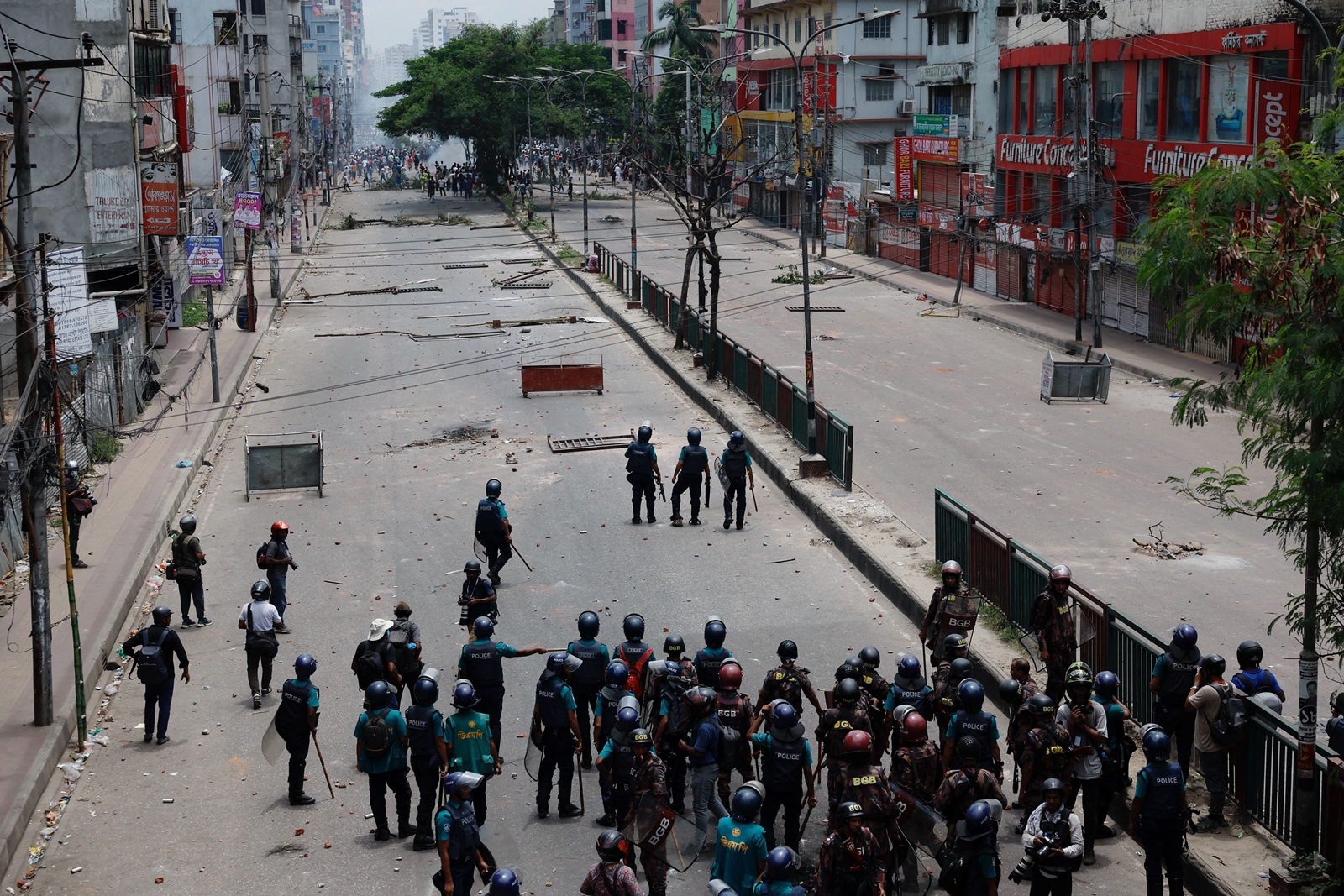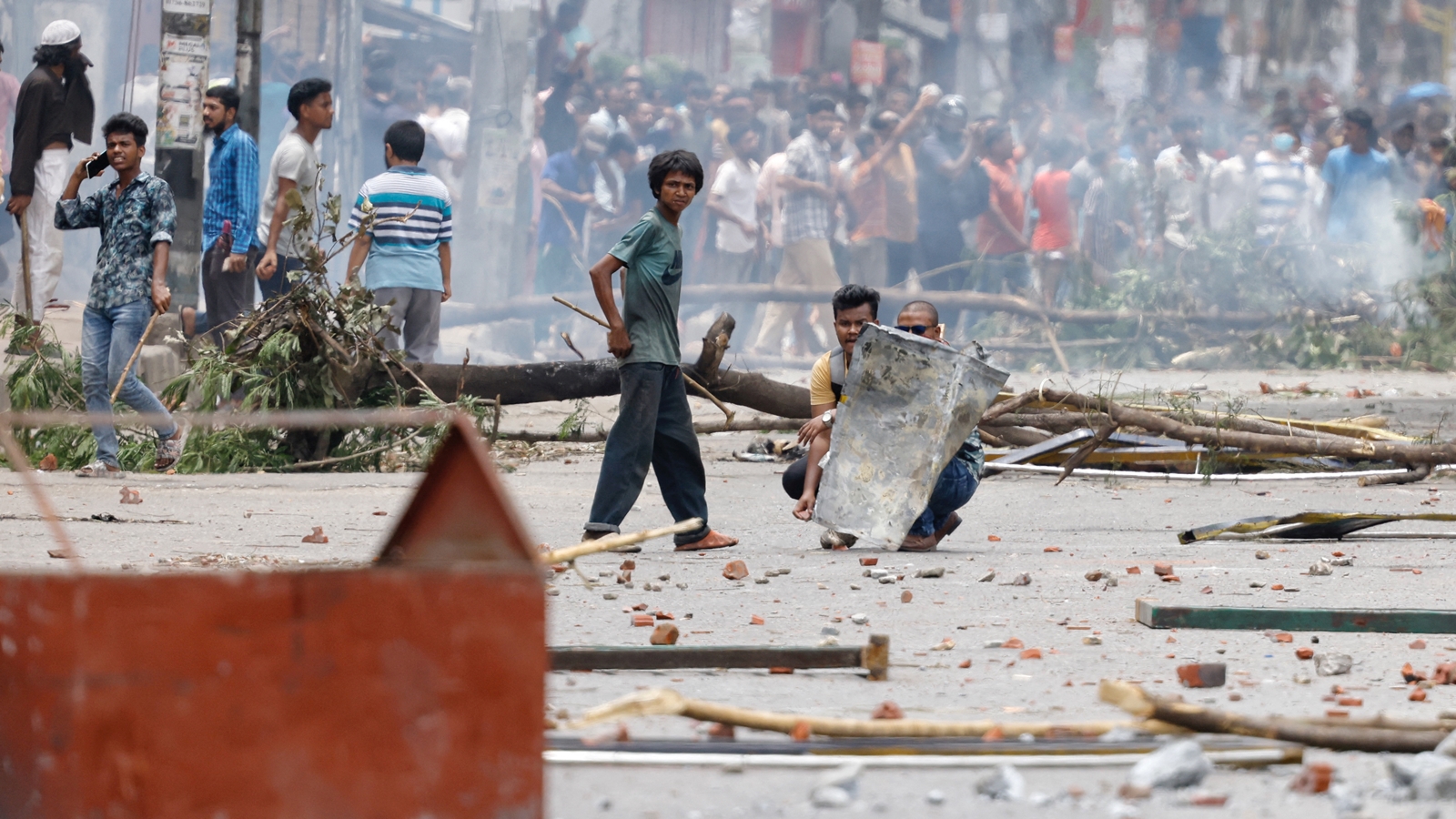There is a sense of hard dichotomies, of the people choosing between two zero-sum options that permeates Bangladesh’s politics. This began soon after the country gained independence and its leadership began drawing hard lines between competing goals and principles – democracy vs economic development, political participation vs national integration, liberty vs equality, and pro-liberation vs anti-liberation forces.
In the ongoing anti-quota protests, too, Prime Minister Sheikh Hasina has invoked “liberation” by comparing those opposed to her policy with “razakars” – a pejorative epithet for those who collaborated with Pakistani forces during the country’s struggle for liberation. The pro/anti-liberation dichotomy has been deployed often in the recent past with regard to controversial policies. These include the Digital Security Act, sending “war criminals” to the gallows and banning the Jamaat-e-Islami.
The current protests were spearheaded predominantly by left-wing and liberal student groups. The Student Federation of Bangladesh, and Bangladesh Jatiotabadi Chatra Dal were among the organisations that backed the campaign, along with the Workers’ Party of Bangladesh (WPB). They have also been supported by the country’s main opposition party, the Bangladesh National Party (BNP), which boycotted the recently concluded elections, alleging undemocratic practices. To be sure, the BNP’s own track record in this regard is hardly without blemish, and thanks in part to the boycott, its political influence and organisational strength is waning.
In Bangladesh, students’ politics has a long and storied history. These groups have been at the centre of crucial movements, starting with the Language Movement from 1948 to 1952, which advocated for Bengali to be recognised as the co-lingua franca, alongside Urdu, of what was then undivided Pakistan, to avoid the imposition of Urdu on the Bengali-speaking populace of East Pakistan. It eventually led to the creation of Bangladesh. Students’ movements were also crucial in the liberation struggle from 1969-1971, the protests against the Ershad regime in 1989, against army intervention in 2007, and the Shahbag Movement in 2013, calling for capital punishment of all those involved in crimes committed during the Liberation War.

Given the long-standing ideological differences between the country’s prominent political parties, along with flailing political institutions, it is easy to understand why such protests become massive. Students’ protests have gradually shifted from common issues and asking for social change to ideological mobilisation.
This time, students of Dhaka University are raising their voices against the government’s policy of “positive reverse discrimination” (the quota system). The students claim that the current reservation policy goes against the constitutional values of equality and equal opportunity. They are invoking Article 29 (1) of Bangladesh’s Constitution, which says, “There shall be equality of opportunity for all citizens in respect of employment or office in the service of the Republic”. However, the student wing of the ruling Awami League argues that the reservation policy is a tool for achieving the cherished goal of social justice and equity. They cite Article 29 (3) (a) which says “the state can make special provisions in favour of any backward section…for the purpose of securing their adequate representation in the service of the Republic”.
The quota system was introduced in Bangladesh as early as 1972. It mandated that 30 per cent of seats in public-sector jobs and higher education institutions would be reserved for freedom fighters and later, for their children and grandchildren. Subsequently, another 10 per cent of seats were reserved in favour of women and an additional 10 per cent reservation was provided for candidates coming from backward districts. Moreover, 5 per cent reservation was provided to members of tribal communities and 1 per cent reservation was awarded to persons with disabilities. Thus, in total, the country has 56 per cent reservation. This became a bone of contention as many believe that such a high proportion of reserved seats ignores merit. The students have been demanding that the system be reformed. In 2018, they carried out massive protests and successfully pressured the government to discontinue the quota system.
The current trouble began on June 5, when the High Court Division of the Supreme Court of Bangladesh nullified the government’s decision to scrap the quota system. It reinstated 30 per cent reservations for freedom fighters and their progeny. This irked opposition parties, especially the BNP. The opposition argues that the ruling benefits the families of pro-government groups who support the Awami League. Protesting students too felt disappointed and angry at being compared to “razakars”. The situation turned violent and conflagrations erupted between the pro-government student groups and the police on the one side and the anti-quota demonstrators on the other, killing over 100 and injuring over 2,500 injured.
The ruling party sees these protests as an effort to dislodge it from power. However, the government has appealed to the Supreme Court to review the decision. The date for the hearing is August 7. The government has agreed to accommodate the protesters by doing away with the quota. But the students are demanding an immediate legislative resolution to the issue.
Unemployment is a major concern in Bangladesh. However, the acceptance of violence as a means to express political disagreement will profoundly affect the country’s stability. Hasina’s fourth consecutive victory has provided comparative political security to Bangladesh and this has yielded dividends for the economy. Bangladesh is set to graduate from being a Least Developed Country by 2026. As it does so, the issue of unemployment needs to be tackled carefully. It’s important to find the balance between aspirations on the one hand and levelling the playing field on the other. What the country needs is to cultivate a culture of greater dialogue as it seeks reforms.
The writer is professor, School of International Studies, JNU




